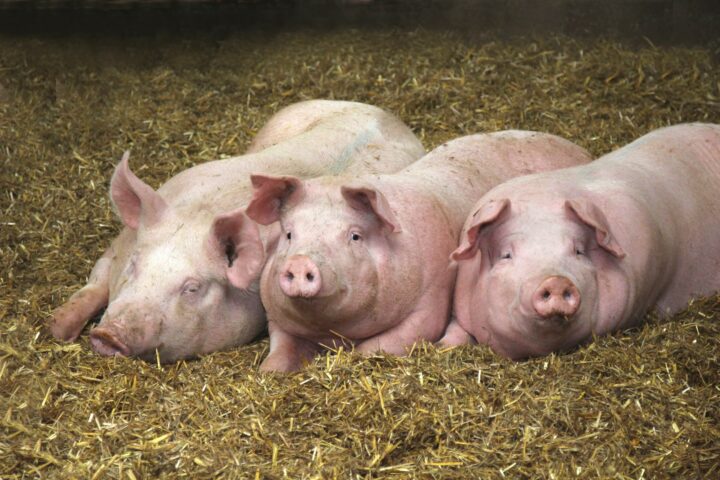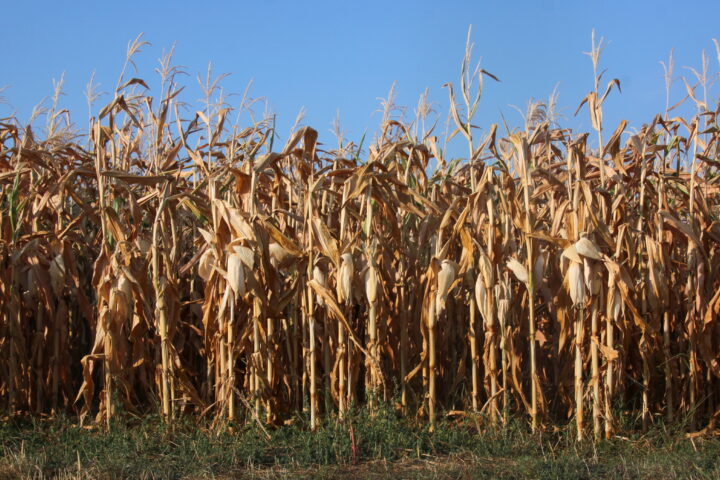
With false narratives against genetic engineering
To denigrate green genetic engineering, narratives that do not stand up to scrutiny keep popping up in the public debate. The aim in each case is political. Recently, the false claims are intended to prevent the regulation of new breeding methods such as Crispr Cas from being technology-friendly.
Thursday, November 2, 2023
SWR-Wissen looks into the question of why Greenpeace threw itself into an unscientific fight against green genetic engineering. We reported on the programme, which is well worth seeing. At the same time, however, the programme also conveys false narratives that repeatedly find their way into the public debate. This Blindspot article takes a closer look at the unscientific stories.
"Concentration of power in the seed market"
First of all, there is the statement that a few corporations share more than 60 % of the global seed market, including genetically modified varieties. But is that really true? In its 2018 report Concentration in Seed Markets, the OECD examined the potential impact of major corporate acquisitions on prices, product choice and innovation in the seed sector and made policy recommendations to protect and promote competition and innovation in plant breeding. It concludes that there are significant differences between the various crops and countries and that it is not possible to speak of concentration across the board. In the case of seeds with genetically modified traits, market concentration is much higher and the market is almost exclusively dominated by large multinational companies because of the high regulatory costs. On the other hand, according to the OECD, data on patents for CRISPR-Cas9 indicate that this new technology is mainly dominated by academic institutes. Policy makers should therefore avoid unnecessary regulatory barriers to market access. This is particularly important given the emergence of new plant breeding technologies, which should also be accessible to smaller companies. Policy makers should also ensure that plant breeders have access to genetic material through efficient procedures and they should facilitate efficient licensing of intellectual property. To accelerate innovation, the OECD advises that the public sector retreat to basic research, leaving applied research and commercialisation to the private sector in the face of rising investment. Policy makers could also encourage private R&D through public-private partnerships. The conclusion of the introduction to the study is noteworthy: "This study also highlights the importance of accurate data to discuss issues of market concentration. Highly aggregated estimates of market concentration, which have been cited in the public debate, give a misleading picture and are not helpful for policy makers given the large differences across cultures and countries."
The latest 2019 edition of the Access to Seeds Index, which measures and compares the efforts of the world's leading seed companies to increase the productivity of smallholder farmers, also contradicts the common narrative: companies such as Syngenta and Bayer are among the best performers in this index. Access to safe, certified seeds is important because the necessary increase in productivity must happen primarily among smallholder farmers in developing countries, so that they can contribute more and in a more stable way to the food security of their countries and to their own better lives. And because, for example, according to Dr Marja Thijssen of Wageningen University, farmers in Africa lose up to 50 per cent of their harvests due to bad or counterfeit seeds.
Blindspot article
"Green genetic engineering has so far failed to deliver on its promises".
Even though this narrative is common, it does not become any truer. Contrary to the narrative, there are several examples that demonstrate the multiple and clear benefits of green genetic engineering to date - beyond golden rice. For example, thanks to built-in insect resistance, smallholder farmers in Asia have to spray their aubergines less.
A meta-analysis by the University of Göttingen, which considered 147 studies from different countries, concluded in 2014 that GMO technology has, on average, reduced the use of pesticides by 37%, increased crop yields by 22% and increased farmers' profits by 68%. The yield and profit increases are higher in developing countries than in developed countries. And this is despite higher prices for the new seeds. A broad-based study from 2018 concludes that genetically modified maize is a success story: it achieves yields that are on average 10 % higher than conventional varieties. The reason for this is the significantly reduced infestation with pests. In addition, the cultivated maize contains about a third less of the plant's own toxins, such as carcinogenic mycotoxins. And a genetically improved maize variety from Syngenta has been shown to increase the feeding efficiency of cattle by 5 %, thereby reducing emissions of climate-damaging methane. Bayer has compiled numerous other facts about the areas of application, distribution and added value of this technology on its website. It is good to see that researchers from Swiss colleges and universities are not discouraged and are pushing ahead with Ingo Potrykus' research against all odds: Navreet Bhullar and her team from ETH Zurich, for example, have developed transgenic rice varieties that not only produce beta-carotene as a precursor of vitamin A in their grains, but also enrich them with iron and zinc. With their multinutrient rice, the research group is leading the way.
"Patents on seeds"
NGOs repeatedly accuse large agricultural companies of natural traitspatenting. However, there are no patents on seeds in general; patents always concern traits that must also be new and innovative. Crossing a resistance trait from a wild plant into a modern high-yielding variety that is popular with consumers, without losing its traits, requires years of breeding research that can correspond to a real novelty. For this reason, the European Patent Office has repeatedly rejected corresponding appeals by NGOs against such patents. But: Such a patent would no longer be granted in Europe today, because the legal situation has changed. Since 2017, properties from wild plants may no longer be patented in Europe (EPO decision of last instance from 2020). However, this new rule on patentability cannot be applied retroactively. It only applies to newly filed patent applications. In the future, the question of patentability of these "natural traits" will no longer arise in relation to European patents since the legal basis has changed. But NGOs continue to use the cherished narrative of patents on seeds to scandalise.
You can find out more about patents and their benefits here: https://swiss-food.ch/en/artic...
More on patents in the field of plant breeding here: https://swiss-food.ch/en/artic...
Kindly note:
We, a non-native editorial team value clear and faultless communication. At times we have to prioritize speed over perfection, utilizing tools, that are still learning.
We are deepL sorry for any observed stylistic or spelling errors.
Related articles

What’s Really in Your Shopping Basket
Genetic engineering in our shopping basket? Yes – and much more often than we think. Whether it’s pasta, bread or vegetables: many of the everyday products we consume come from mutation breeding, which involves altering the genome and is considered safe. It’s high time to debunk the common myths.

Genomic breeding methods are not given a chance to prove themselves
Modern genomic breeding methods are legally classified as genetic engineering – and are therefore still effectively blocked. Yet we have been eating genetically modified plants for decades, just under the label of “classical mutagenesis.” The new, more precise techniques are regulated more strictly than the old ones, even though they are considered safer from a scientific perspective. A contradiction that urgently needs to be corrected. The EU is setting a good example.

No Pig Business: Why Testicle-Free Boars Are a Clear Win for Animal Welfare
New breeding methods are opening up new possibilities in both plant and animal breeding. They allow targeted genetic changes that can make animals more resilient, adaptable, and healthier.

Stagnation instead of progress: Switzerland risks falling behind in new breeding techniques
An overview article in Schweizer Bauer shows how much the new breeding methods are preoccupying farming circles. Once the consultation process on the federal law has been completed, a bill is expected – then it will become clear whether there is actually the political will to approve it.

